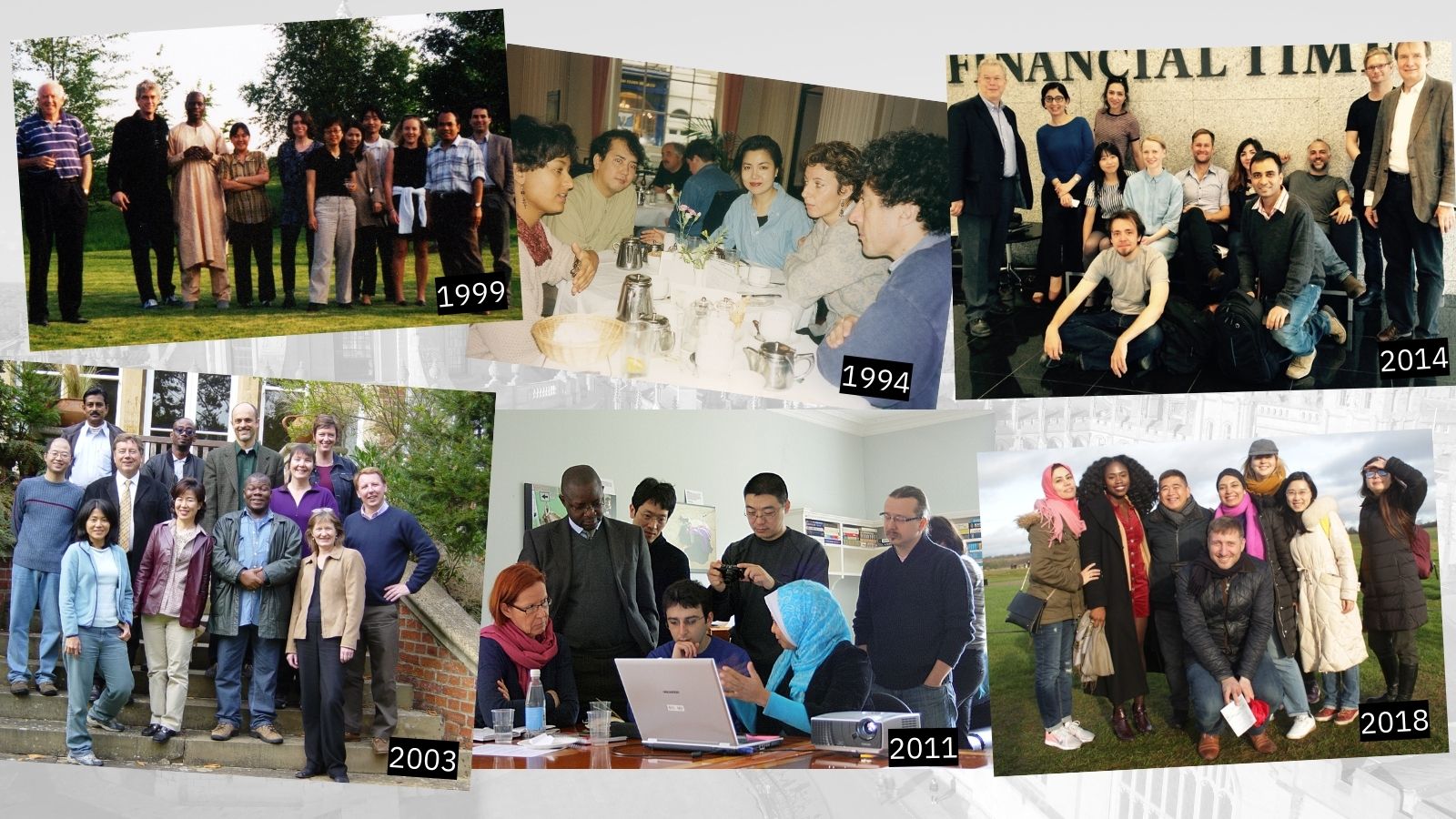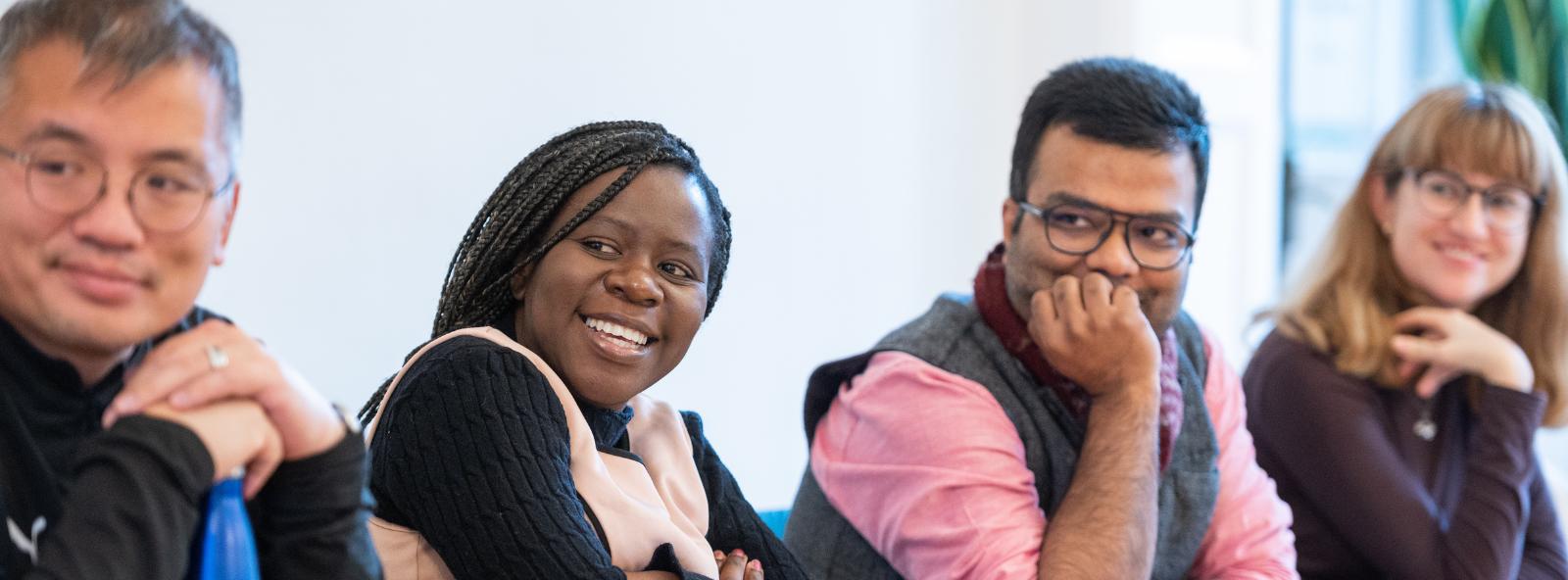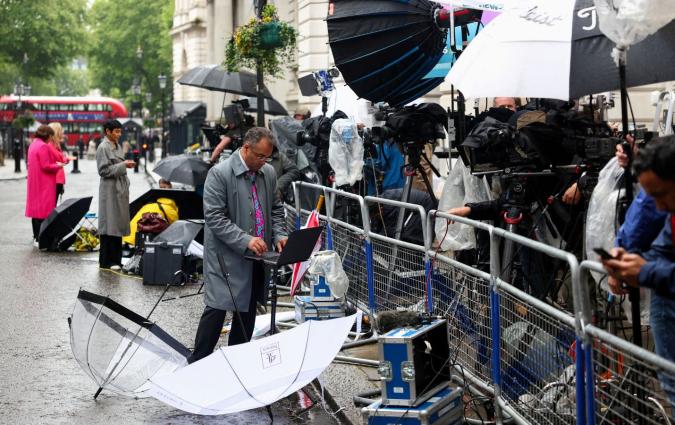The Journalist Fellowship Programme at the Reuters Institute is one of the world’s leading schemes for practising, mid-career journalists to take some time out from their day jobs to explore journalism in depth. The majority of our Journalist Fellows are fully-funded and they also receive a stipend to cover living and travel costs.
Applications are now open for fellowships for the 2026-27 academic year.
Through personal research, seminars, networking events and discussions with your peers, you will further your understanding of journalism, the news industry and your place in it. While you are in Oxford, you will work on a project that will be of direct impact to you, your career, your newsroom and the wider media industry, bringing in what you learn during your time in the fellowship. This is a programme for working journalists and editors who will return to journalism after spending a few months with us.
We accept around 30 Journalist Fellows from around the world each year, each of whom bring fascinating insights and a wealth of experience to the institute. Here’s what is unique about our programme:
- You will be embedded in a cutting-edge institution that is shaping key media debates. The Reuters Institute produces world-class research on the main challenges of the industry.
- You will be part of an institution with a global outlook. Our Journalist Fellows come from all over the world. They share ideas and experiences of working in different countries and different mediums.
- You will be part of one of the world’s greatest universities. Oxford offers unrivalled study facilities, leading research centres, extensive learning support and a global reputation.
- You will be just one hour from London by train, providing convenient access to some of the world’s leading news publishers like The Guardian, the Financial Times and the BBC.
Fellowships last three or six months, depending on their funding. They begin in either October, January or April. We will advise you on the best days to arrive in Oxford. Our calendar follows the university’s term dates.
You are expected to be here during term time for the entire duration of your fellowship. You will be able to travel for short periods as long as you don’t miss any scheduled events.
Most journalists on the programme are fully funded. Successful applicants get their fees covered and receive a monthly stipend of £2,000, which will be enough to cover the cost of accommodation, food, and general living expenses. We will also cover the cost of travel to and from the UK and any visa costs. Fellows should refrain from professional work during the fellowship.
Additionally, some Journalist Fellows are employees of sponsoring organisations which run their own application process and selection criteria. Please contact us if you want more information on joining the fellowship with these or any other sources of funding.
Applications are now open for fellowships beginning in October 2026, January 2027 or April 2027.
To be considered for one of our journalist fellowships, you must have a minimum of five years' journalistic experience, or in rare cases demonstrate the equivalent level of expertise. Freelancing is not a barrier to application, but we do not accept applications from those working in public affairs, public relations or corporate communications.
Our Journalist Fellowships are open to journalists from all over the world, including Europe, Africa, the Asia-Pacific region, North America, and Latin America.
Applicants must plan to return to journalism after completing their fellowship.
English language proficiency is not tested, but you will be able to understand and join in discussions in English. You can find more information on the university's English language requirements here.
From personal study in the University of Oxford’s magnificent libraries to informal conversations with your global cohort of Journalist Fellows, each aspect of the programme will increase your appreciation of the challenges and the opportunities of the current news ecosystem. The programme is designed to challenge you, to offer a fresh perspective on your role as a journalist, and to enable you to share and receive best practice on the issues that matter to you.
Your first week.
You will jump into the deep end with a series of seminars and discussions on some of the key issues affecting journalism, including misinformation, trust, sustainability, audience engagement, press freedom and more. You will also enjoy dinners, drinks, walks and plenty of opportunities to get to know your colleagues and the people working at the Institute.
Our seminars and conferences.
Every week you will take part in regular seminars led by distinguished journalists, editors, industry leaders and academics from around the world. You will also get many chances to talk with your colleagues and learn about the challenges journalism is facing in their countries and what can be done to address them. You will also attend high-level conferences and talks put on by other academic and industry organisations. See some of our previous seminars and events.
Events in Oxford.
Additionally, you will be able to attend the many talks and lectures taking place in Oxford on journalism, the media and wider issues like politics, international relations, cultural studies, technology and more. Here are a few links where you can check them.
- Oxford University Media Society
- Lady Margaret Hall
- Oxford Internet Institute
- Oxford Union
- All Oxford University talks
The project.
This is not an academic course, but you will spend much of your time working on a project that is relevant for you, your newsroom or the wider industry. We will guide you closely on planning your project and accessing the resources that are available to you. See projects by our former Journalist Fellows.
Symposiums.
At the end of each term, Journalist Fellows put together a symposium with presentations and panel discussions around a particular theme. These discussions are based on what they have learned during their time in Oxford but also on professional experiences they are willing to share. These events are open to the public, often take place in London, and are great opportunities to raise your profile.
Things to do in Oxford.
From going out for coffee or food, taking in culture and entertainment, to exploring the city and its surroundings, this crowdsourced list of things to do in Oxford, with suggestions from Journalist Fellows and staff, is a good starting point to knowing our lovely home.
We accept around 30 Journalist Fellows from around the world each year, each of whom bring fascinating insights and a wealth of experience to the institute. Here’s what is unique about our programme:
- You will be embedded in a cutting-edge institution that is shaping key media debates. The Reuters Institute produces world-class research on the main challenges of the industry.
- You will be part of an institution with a global outlook. Our Journalist Fellows come from all over the world. They share ideas and experiences of working in different countries and different mediums.
- You will be part of one of the world’s greatest universities. Oxford offers unrivalled study facilities, leading research centres, extensive learning support and a global reputation.
- You will be just one hour from London by train, providing convenient access to some of the world’s leading news publishers like The Guardian, the Financial Times and the BBC.
Fellowships last three or six months, depending on their funding. They begin in either October, January or April. We will advise you on the best days to arrive in Oxford. Our calendar follows the university’s term dates.
You are expected to be here during term time for the entire duration of your fellowship. You will be able to travel for short periods as long as you don’t miss any scheduled events.
Most journalists on the programme are fully funded. Successful applicants get their fees covered and receive a monthly stipend of £2,000, which will be enough to cover the cost of accommodation, food, and general living expenses. We will also cover the cost of travel to and from the UK and any visa costs. Fellows should refrain from professional work during the fellowship.
Additionally, some Journalist Fellows are employees of sponsoring organisations which run their own application process and selection criteria. Please contact us if you want more information on joining the fellowship with these or any other sources of funding.
Applications are now open for fellowships beginning in October 2026, January 2027 or April 2027.
To be considered for one of our journalist fellowships, you must have a minimum of five years' journalistic experience, or in rare cases demonstrate the equivalent level of expertise. Freelancing is not a barrier to application, but we do not accept applications from those working in public affairs, public relations or corporate communications.
Our Journalist Fellowships are open to journalists from all over the world, including Europe, Africa, the Asia-Pacific region, North America, and Latin America.
Applicants must plan to return to journalism after completing their fellowship.
English language proficiency is not tested, but you will be able to understand and join in discussions in English. You can find more information on the university's English language requirements here.
From personal study in the University of Oxford’s magnificent libraries to informal conversations with your global cohort of Journalist Fellows, each aspect of the programme will increase your appreciation of the challenges and the opportunities of the current news ecosystem. The programme is designed to challenge you, to offer a fresh perspective on your role as a journalist, and to enable you to share and receive best practice on the issues that matter to you.
Your first week.
You will jump into the deep end with a series of seminars and discussions on some of the key issues affecting journalism, including misinformation, trust, sustainability, audience engagement, press freedom and more. You will also enjoy dinners, drinks, walks and plenty of opportunities to get to know your colleagues and the people working at the Institute.
Our seminars and conferences.
Every week you will take part in regular seminars led by distinguished journalists, editors, industry leaders and academics from around the world. You will also get many chances to talk with your colleagues and learn about the challenges journalism is facing in their countries and what can be done to address them. You will also attend high-level conferences and talks put on by other academic and industry organisations. See some of our previous seminars and events.
Events in Oxford.
Additionally, you will be able to attend the many talks and lectures taking place in Oxford on journalism, the media and wider issues like politics, international relations, cultural studies, technology and more. Here are a few links where you can check them.
- Oxford University Media Society
- Lady Margaret Hall
- Oxford Internet Institute
- Oxford Union
- All Oxford University talks
The project.
This is not an academic course, but you will spend much of your time working on a project that is relevant for you, your newsroom or the wider industry. We will guide you closely on planning your project and accessing the resources that are available to you. See projects by our former Journalist Fellows.
Symposiums.
At the end of each term, Journalist Fellows put together a symposium with presentations and panel discussions around a particular theme. These discussions are based on what they have learned during their time in Oxford but also on professional experiences they are willing to share. These events are open to the public, often take place in London, and are great opportunities to raise your profile.
Things to do in Oxford.
From going out for coffee or food, taking in culture and entertainment, to exploring the city and its surroundings, this crowdsourced list of things to do in Oxford, with suggestions from Journalist Fellows and staff, is a good starting point to knowing our lovely home.
Applications are now open for fellowships beginning in October 2026, January 2027 or April 2027. Applications close on Friday 13 February 2026, 23:59 (UK time).

The programme is now more than 40 years old. It was established by the Thomson Reuters Foundation (TRF) at the University of Oxford in 1983, and situated in Green College (now Green Templeton College) in 1992, before becoming part of the Reuters Institute when it was founded in November 2006. Every five years, alumni are invited to reconnect for a special weekend of celebrations in Oxford. TRF is a core funder of the programme and has sponsored dozens of fellows throughout the years.
As a Journalist Fellow, I created some of my best work so far. The programme, the environment, and the community gave me rare intellectual permission to aim higher and think deeper - and I left with friendships for life

My time as a Journalist Fellow was among the most fulfilling of my career, offering rare time and exceptional support to pursue work that served my outlet and advanced broader conversations about journalism’s purpose

- Subscribe to our free newsletter
- Sign up for our daily roundup on journalism worldwide
- Subscribe to our podcast on your favourite platform: Apple | Spotify
- Follow us on: Bluesky | X | Instagram | LinkedIn
- Explore: our research | our pieces on journalism | our podcast
- Read our signature Digital News Report 2025




